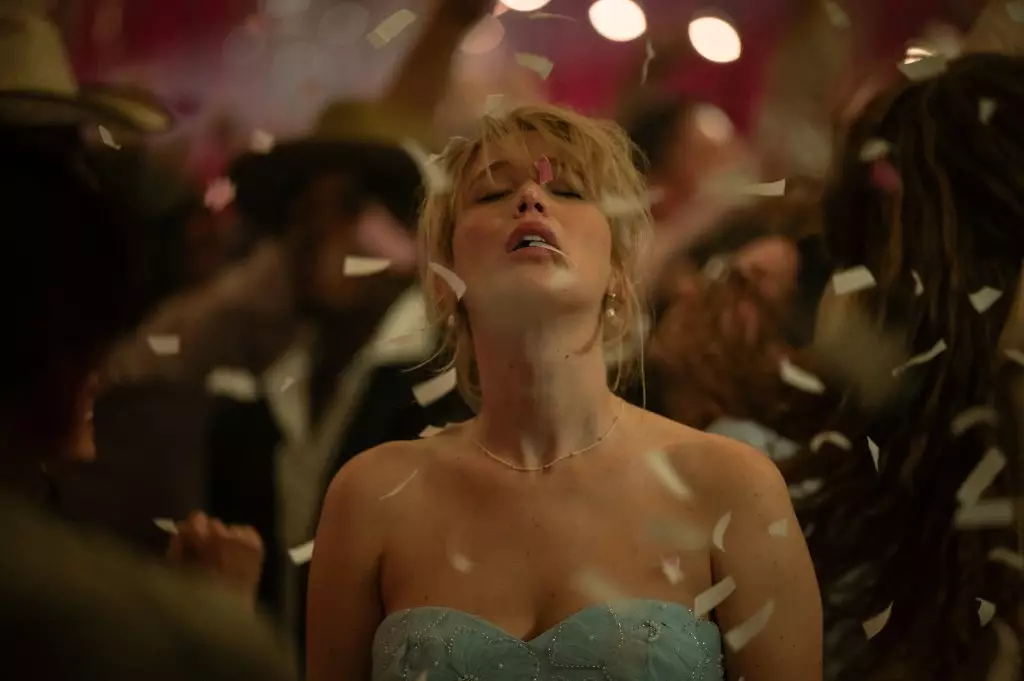Last night, the glittering streets of Cannes were ablaze with anticipation as Hollywood luminaries Jennifer Lawrence and Robert Pattinson graced the red carpet for the premiere of Lynne Ramsay’s haunting new drama, *Die, My Love*. It’s hard to ignore the palpable buzz that surrounds this film, not only due to its impressive cast—also including LaKeith Stanfield, Sissy Spacek, and Nick Nolte—but because it boldly tackles the taboo subject of a woman’s battle with postpartum depression. This bravely unsettling portrait, derived from Ariana Harwicz’s novel, is poised to both challenge audiences and ignite debates on mental health woes that often remain unspoken in contemporary society.
A Journey into the Abyss
At its core, *Die, My Love* serves as a raw examination of a woman’s mental decline, spiraling into despair and chaos under the crushing weight of post-natal depression. Lawrence’s character, Grace, confronts the heavy burden of motherhood coupled with the complications wrought by her husband—played by Pattinson—and his treacherous infidelity, complicating her narrative of psychological strife. Ramsay’s direction has been lauded for its mesmerizing qualities; Damon Wise of Deadline describes it aptly as a “brutal but beautiful story.” Perhaps this juxtaposition of beauty and brutality is what elevates Ramsay’s film beyond mere dramatization, inviting viewers into a profound reflection on female psychology.
Unleashing the Star
It’s undeniable that Lawrence’s performance is the beating heart of this chaotic symphony. Critics are almost uniformly agreeing that we witness the actress in an extremely raw light—a shedding of her glamorous image—unearthing a ferocity and vulnerability that has rarely been seen on-screen. The Daily Beast’s portrayal of Lawrence’s magnetic performance as one destined for future Academy Award nods is hard to dispute. When she throws herself into the role, it’s not merely acting; it feels like the raw essence of motherhood and its latent anxieties explode into being.
In an industry where female narratives are often sidelined or sterilized, Ramsay holds a mirror to the gritty realities of womanhood—one that is at once chaotic and realistic. Lawrence encapsulates this struggle; the exhilaration and despair both symbolize the duality of parenting and self-identity. Critics like those at Indiewire and Vanity Fair have rightly noted her transformation into a feral, tormented character, prioritizing authenticity over likability—something we desperately need in our current cinematic landscape.
The Bray of Other Voices
Yet, as with any ambitious artistic venture, not every voice joins the enthusiastic chorus. Variety’s lukewarm reception highlights a critical perspective suggesting that the film may focus more on “violent dysfunction” than genuinely examining its characters’ inner lives. This is an important concern; art must also tread the delicate balance of aesthetic depravity while revealing deeper human truths. If *Die, My Love* sacrifices emotional nuance at the altar of insomnia-induced poignancy, perhaps it risks becoming a mere spectacle of trauma rather than a profound exploration of it.
Moreover, while Ramsay’s work is undeniably intense, the film’s heavy reliance on the visceral rather than the cerebral brings forth questions about whether we’re mining true insight or indulging a sensationalist portrayal of postpartum struggles. This critique opens a dialogue about the portrayal of mental health in cinema: Are we merely spectators of dysfunction, or can these stories be vehicles for genuine understanding and empathy?
Defining a New Era
As *Die, My Love* begins to etch its mark on the festival circuit, it raises critical questions for both filmmakers and audiences alike. Is the allure of artistic expression sometimes overshadowed by the desire to shock? In its exploration of daunting subject matter, does it succeed in reaching deeper truths about mental health and femininity? Or does it simply sensationalize misery?
Regardless of its reception, one thing is clear: the film signifies a bold step for Ramsay in her already commendable career and, by extension, challenges the film industry to refine its portrayal of women’s stories. As we navigate through the minefield of representation within cinema, *Die, My Love* stands as a confrontational piece that grapples with the tumultuous nature of womanhood, reminding us of the paradox between beauty and destruction in the human experience.

